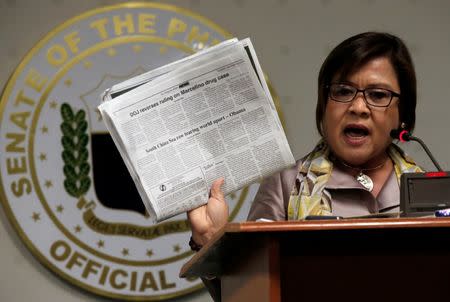Philippine agency files graft, narcotics charges against Duterte critic
MANILA (Reuters) - A Philippine law enforcement agency filed bribery, graft and drug-related complaints against a senator and former minister on Thursday, in the first step towards prosecuting the biggest critic of President Rodrigo Duterte's war on drugs. The cases were lodged by the National Bureau of Investigation (NBI), the Philippine equivalent of the U.S. Federal Bureau of Investigation, against Senator Leila de Lima, two former prison officials and a dozen inmates for involvement in the illegal drug trade at a national jail. "It is evident from the revelations of numerous witnesses as detailed in their sworn affidavits that ... de Lima was fully aware of the unlawfulness of their actions," said the NBI complaint. De Lima, a former justice secretary, has been trying for years to link Duterte to involvement in large numbers of drug killings when he was mayor of Davao, long before he became president and launched a similar crackdown on a national scale. More than 2,300 people have been killed in the four-month campaign, mostly in police operations to arrest suspects and others classified as deaths under investigation and believed to be the work of vigilantes. The NBI said de Lima had protected a favored inmate at the prison to facilitate illegal drug deals in exchange for money she collected every month. The case was filed before the justice department. "I'm no longer surprised when this administration files trumped-up charges against me," de Lima said in a statement. She described the evidence against her as "fantastic lies and fairytales". On Monday she lodged a writ with the Supreme Court seeking to stop what she called harassment and intrusion into her private life by Duterte and his allies. The NBI gathered testimonies from the recent congressional hearings about the prison drugs trade, which were launched just days after de Lima was ousted by fellow senators as head of a Senate probe into Duterte's crackdown. The case includes documentary evidence and interviews with more witnesses about a lucrative illicit drug trade in prisons it said had the approval of de Lima. If the cases go to court and de Lima is found guilty, she faces up to 30 years in prison. (Reporting by Manuel Mogato; Editing by Martin Petty & Simon Cameron-Moore)





